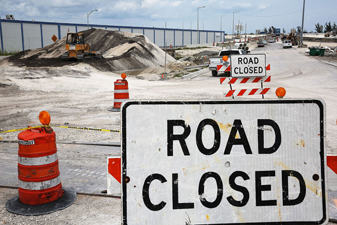|
By Anna Denecke, Associate, Blakey & Agnew
Since Franklin D. Roosevelt's New Deal, the first 100 days of a president's administration have been used as a marker to judge their effectiveness and influence. The first 100 days are a period when the new President's mandate from voters is at its strongest, and theoretically, when his or her influence is the greatest.
Given that the long 2016 Presidential race is now drawing to a close, the first 100 days of a new Administration are right around the corner. For the infrastructure and transport sector, there's hope in either a President Clinton or a President Trump. Both candidates have indicated they plan to push for a robust infrastructure investment bill that would serve to shore up our transportation network and strengthen the middle-class.
According to Hillary Clinton's website, the Democratic nominee plans to introduce a five-year, $275 billion dollar infrastructure plan within her first 100 days in office. Dollars would be invested in ports, airports, waterways, and roads, with special attention to alleviating chokepoints in the freight network and improving U.S. competitiveness in the global economy. Secretary Clinton's infrastructure plan would allocate $25 billion to a national infrastructure bank, to be run by a bipartisan board of directors authorized to provide loans and loan guarantees, among other responsibilities.
Clinton's infrastructure investment plan would be paid for through corporate tax reform. While she has not yet offered specifics, some have speculated she's considering President Obama's framework, which he offered as part of his FY2016 budget last spring. Under Obama's proposal, corporations would be subject to a one-time "deemed reparation" of offshore earnings, which would generate approximately $268 billion in revenues.
Meanwhile, Donald Trump, the Republican nominee for President, is also calling for a major infrastructure investment initiative. While the Trump campaign has not yet offered a detailed investment plan, Trump's website promotes an economic vision that includes a boost in infrastructure as a path toward growth.
In an August 2 interview with Fox Business Network, Trump suggested that he would "at least double" Clinton's proposed investments in infrastructure as President. When asked about how to pay for such a proposal, Trump responded, "The citizens would put money into the fund. It would be a great
|

investment, and it would put a lot of people to work." Subsequently, at a campaign rally in Detroit, Michigan, on August 8, the candidate promised his Administration would "build the next generation of roads, bridges, railways, tunnels, sea ports, and airports."
If Clinton and Trump rhetoric sounds familiar, it might be because past presidents have often focused on infrastructure during their first 100 days in office. Most recently, President Obama and the 111th Congress included $150 billion in infrastructure investments as part of the American Recovery and Reinvestment Act (ARRA) of 2009, more commonly known as the stimulus. ARRA directed $17 billion to public transit and high-speed rail projects and $40 billion to shovel-ready traditional infrastructure projects. Other funds were reserved for technological capacity expansion projects, like increasing broadband access.
Of course, as with any stimulus, Congress has a major say in determining how much money is authorized and to how it's distributed. So far, Congressional Republicans have showed little appetite for an infrastructure investment plan early in the next Administration, no matter whether it's Trump or Clinton at the helm.
After Trump touted his infrastructure investment plan, The Atlantic reached out to House Speaker Paul Ryan (R-WI) for comment. A spokeswoman for Ryan responded, "House Republicans are focused on our 'Better Way' agenda," which does not include any new funding for infrastructure. Ryan's office also pointed to the $305 billion, Fixing America's Surface Transportation Act, a comprehensive, five-year surface transportation bill that was passed in December 2015, implying that such an investment was sufficient for the time-being.
Blakey & Agnew, LLC is a public affairs and
communications consulting firm based in
Washington, DC.
|





